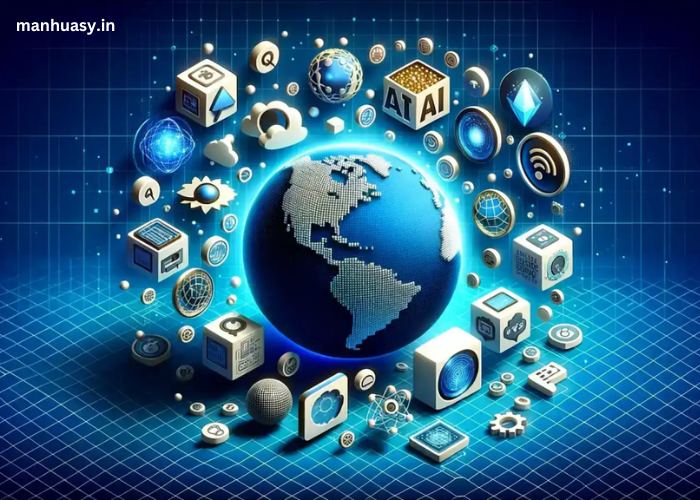Cutting-Edge Tech Trends Shaping the Future of Industries
As we move into 2025, industries around the world are undergoing dramatic transformations driven by emerging technologies. These cutting-edge innovations are poised to reshape the way businesses operate, offer products and services, and interact with customers. From artificial intelligence (AI) and 5G to blockchain and quantum computing, technology is influencing every aspect of business, driving efficiency, fostering innovation, and creating new market opportunities.
In this article, we will explore the top tech trends shaping the future of industries and how they are impacting various sectors.
The business world is being revolutionized by technology. In 2025, the role of technology in driving business success will be more important than ever. Industries are adopting new technologies not only to improve operational efficiency but also to meet the ever-evolving demands of consumers and the competitive landscape. These technologies have the potential to accelerate growth, enhance customer experiences, and solve complex challenges faced by organizations.
Key Points:
- AI and automation will redefine how businesses operate.
- 5G will drive faster, more reliable communication for industries.
- Blockchain will provide secure, transparent solutions for businesses.
1. Artificial Intelligence and Automation
Artificial intelligence (AI) and automation are undoubtedly two of the most impactful technologies reshaping industries. AI, combined with machine learning, is enabling businesses to make smarter decisions and streamline operations. Automation, powered by AI, is helping companies reduce costs, improve productivity, and deliver personalized experiences at scale.
How AI and Automation are Impacting Industries in 2025
AI’s ability to analyze massive amounts of data and identify patterns is revolutionizing industries like healthcare, finance, manufacturing, and retail. For example, in healthcare, AI algorithms are being used to diagnose diseases early by analyzing medical images or patient data. In retail, AI-powered recommendation engines are improving customer experiences by offering personalized product suggestions based on previous behavior.
Automation is also freeing up valuable human resources by handling repetitive, mundane tasks. This allows employees to focus on more strategic and creative activities that require human expertise.
Example:
- Manufacturing: AI and robotics are automating production lines, improving product quality and reducing human error.
- Retail: AI-powered chatbots are enhancing customer service by providing 24/7 assistance and personalized product recommendations.
In the coming years, businesses across industries will continue to rely on AI and automation to drive efficiency and stay competitive.
2. 5G Technology
The rollout of 5G technology is one of the most anticipated technological advancements of the decade. With faster speeds, lower latency, and greater connectivity, 5G is expected to change how industries communicate, collaborate, and operate.
How 5G Will Reshape Industries in 2025
5G offers speeds up to 100 times faster than 4G, with latency as low as one millisecond. This allows industries to move data quickly and efficiently, opening up new possibilities for innovation. In sectors like healthcare, 5G will enable remote surgeries, telemedicine, and real-time monitoring of patients. In transportation, 5G will help power autonomous vehicles by providing instant communication between vehicles and infrastructure.
Furthermore, 5G will play a critical role in the Internet of Things (IoT) ecosystem, providing the bandwidth needed for IoT devices to connect and share data seamlessly. This will lead to smarter cities, connected homes, and smarter industries.
Example:
- Healthcare: 5G will enable doctors to perform surgeries remotely using advanced robotics and real-time data sharing.
- Automotive: 5G will facilitate the development of self-driving cars by allowing them to communicate with each other and traffic systems.
As 5G networks expand, industries will experience greater speed, connectivity, and opportunities for innovation.
3. Blockchain Technology
Blockchain, best known for its association with cryptocurrencies like Bitcoin, is a groundbreaking technology that offers decentralized, secure, and transparent data management. While it initially found use in the financial sector, blockchain is rapidly being adopted in a wide range of industries.
How Blockchain Will Transform Industries in 2025
Blockchain’s ability to create immutable and transparent records makes it ideal for applications in supply chain management, finance, and healthcare. In supply chains, blockchain allows businesses to track products and materials at every stage of their journey, ensuring authenticity and reducing fraud.
In finance, blockchain is enabling faster and more secure cross-border payments while reducing transaction fees. In healthcare, blockchain technology is improving the management of patient data, ensuring that it remains secure, accessible, and transparent.
Blockchain’s potential to revolutionize industries lies in its ability to provide trust and security in an increasingly digital world.
Example:
- Supply Chain: Blockchain will ensure that products are sourced ethically and traceable from origin to consumer.
- Finance: Blockchain will speed up international payments by eliminating intermediaries and reducing transaction times.
By 2025, blockchain will play a central role in providing transparent and efficient solutions across various industries.
4. Quantum Computing
Quantum computing is an emerging field that promises to solve problems that classical computers cannot. Quantum computers have the ability to process information at exponentially faster rates, making them invaluable for industries that rely on complex simulations, optimizations, and calculations.
How Quantum Computing Will Impact Industries in 2025
While quantum computing is still in its early stages, its potential to revolutionize industries is undeniable. In sectors such as pharmaceuticals, quantum computing can accelerate drug discovery by simulating molecular structures and interactions much faster than traditional computers.
In finance, quantum computers will optimize risk assessments and portfolio management, providing more accurate predictions and better decision-making. In logistics, quantum computing will help businesses optimize supply chain routes and resource allocation, reducing costs and improving efficiency.
Example:
- Pharmaceuticals: Quantum computing will help researchers design new drugs by simulating complex molecular interactions.
- Finance: Quantum algorithms will improve investment strategies by analyzing vast datasets in real time.
Quantum computing has the potential to unlock solutions to some of the world’s most complex problems, and its impact will be felt across industries.
5. Sustainable and Green Technologies
As environmental concerns continue to rise, businesses are increasingly turning to sustainable technologies to reduce their carbon footprints and meet consumer demands for eco-friendly products and services. The push for sustainability is not only a response to environmental challenges but also a significant business opportunity.
How Sustainable Technologies Will Shape Industries in 2025
Renewable energy, electric vehicles (EVs), and green manufacturing practices are just a few examples of the technologies that will be driving sustainability in industries by 2025. As the cost of renewable energy technologies like solar and wind continues to decrease, businesses will be able to transition to greener energy sources, reducing their dependence on fossil fuels.
In transportation, EVs will become more widespread, helping to reduce emissions and improve air quality. Green manufacturing technologies will enable companies to reduce waste, recycle materials, and produce goods more sustainably.
Example:
- Energy: Solar and wind power will provide businesses with cleaner, renewable energy sources.
- Transportation: Electric vehicles will replace traditional gasoline-powered cars, reducing transportation emissions.
Sustainability will be a driving force behind innovation and change across industries as businesses work to minimize their environmental impact.
Conclusion
In 2025, technology will continue to drive dramatic changes across industries. From AI and automation to 5G, blockchain, quantum computing, and sustainability, businesses must adapt to these cutting-edge tech trends to stay competitive and succeed in the future. These innovations will not only improve operational efficiency but will also open new opportunities for growth, collaboration, and customer engagement.
Companies that embrace these revolutionary technologies will lead the charge in industry transformation, shaping the future of business for years to come.



